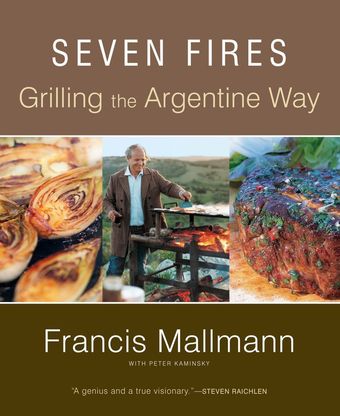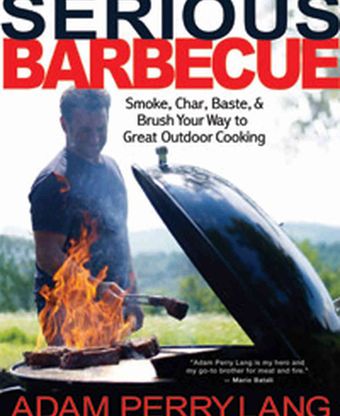These books both treat outdoor cooking with fire and coals, but they're very different in approach, voice, and design.
Francis Mallmann's Seven Fires is a beautifully photographed and designed book about Argentine traditions of countryside cooking with wood fire and coals: mainly on a grill or a griddle, the chapa, but also on an upright frame, in the ashes of the fire, and an ingenious small-scale version of pit-cooking, in a wheelbarrow. The recipes are simple but unusual, and good. Though the focus is on meats, most spectacularly a whole cow, the range of dishes is quite wide, and some of my favorites were vegetables and fruits. Both beets and potatoes are boiled whole, then flattened between the hands to maximize their brownable surface area and finished on the chapa (an iron griddle set over a fire), the potatoes with a crust of tapenade. Oranges are dipped in sugar and cooked on the chapa with rosemary until caramelized and then some.
Points off for perpetuating the myth that a high-temperature crust will seal in the juices of a steak, and claiming that long cooking over moderate heat gives an even doneness edge to edge (belied by the photograph). Points given for timings that nevertheless worked as promised, and for some interesting reflections, for example on harmony as an overrated quality in foods -- "disharmony in cuisine calls attention to the basic nature of the ingredients" -- and on the appeal of the burned.
Adam Perry Lang's Serious Barbecue includes steaks and burgers. About 300 pages are devoted to meats, 50 to sides. Where Seven Fires is understated and cool, Serious Barbecue is bright and saturated, the photos with color, the text with Lang’s self-described quest for intensity of flavor. The rib, shoulder, burger and grilled corn recipes I tried were indeed tasty, but many call for long and similar lists of ingredients that meld into a general sweet, fruity, salty spiciness. A typical pork recipe calls for the meat to be soaked and/or injected with brine, seasoned with a dry spice blend, basted and honey-glazed over the course of many hours, then sauced both on the grill and on a cutting board wetted down with the sauce. Lang's basic sauce has 18 ingredients, his vinaigrette 14. Lots of flavors. It’s true that all the elaborate preparations and attentions are deeply, oddly satisfying.
Points off for not addressing the challenges of slow cooking on domestic-sized grills, where the air temperature is deceptive, and for a barbecue method that in my experience undid hours of long slow cooking with a period of high heat that is created when the meat is wrapped in foil: when you do this, evaporation no longer cools the meat, and its temperature rises. Points given for an excellent Q&A on barbecue science with David Arnold, resident genius at the French Culinary Institute, and valuable pages on recognizing meat quality -- heirloom pork is great, Lang asks, but how has it fared in the food chain? Does the store sell enough of it for it to be in good shape and worth the premium?
My choice: Seven Fires, for its simplicity, variety, and suggestiveness.



4 Comments
McGee quibbles about the instructions for meat prep, but he is one who knows better than any of us, so those details may be neither here nor there to us mere mortals. Besides, I have found often that equally qualified experts will assert completely contradictory instructions for basic preparations, so this sort of thing is always somewhat subjective anyway.
The editors hired good recipe developers, so the elegant sides seem actually possible to reproduce. The story about Mallmann's potato feast is stunning, and really shows his deserved bravado. I'm so glad to have finally been introduce to Argentina's titan of fire.